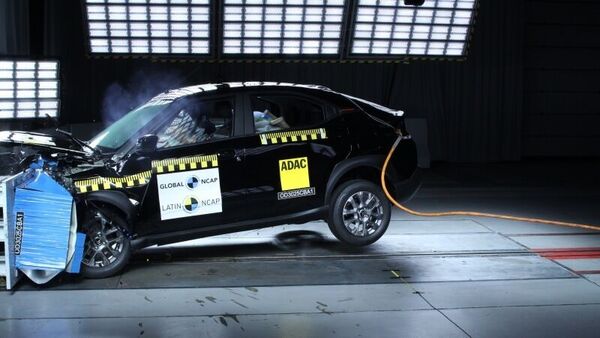Under the updated, more stringent Latin NCAP protocol, the Basalt scored 39.37 per cent in Adult Occupant Protection, 58.35 per cent in Child Occupant Protection, 53.38 per cent in Pedestrian Protection, and just 34.88 per cent in Safety Assist systems.

View Personalised Offers on
Citroen’s safety record has once again come under the spotlight, this time with the Basalt undergoing the Bharat NCAP evaluation. The outcome marks a clear departure from the controversy stirred last year when the Citroen C3 Aircross returned a zero-star rating in Latin NCAP tests, triggering widespread criticism of the brand’s safety prioritisation for emerging markets. With the Basalt now securing a four-star result under India’s own crash test regime, the conversation around Citroen’s safety strategy deserves a closer look.


Under the updated, more stringent Latin NCAP protocol, the Basalt scored 39.37 per cent in Adult Occupant Protection, 58.35 per cent in Child Occupant Protection, 53.38 per cent in Pedestrian Protection, and just 34.88 per cent in Safety Assist systems. While the SUV is equipped with four airbags and ESC as standard in the version tested, Latin NCAP noted that side head protection such as curtain airbags is not available, not even as an option. With this, the Citroen Basalt was granted a zero star safety rating by Latin NCAP.
Also Read : Citroen Aircross X launched: What’s new over the older model explained
During the frontal crash test, the Basalt exhibited asymmetrical behaviour, a different strength reinforcement on one side compared to the other, indicating cost-optimised design instead of equal protection purpose. Chest protection for the front passenger was rated weak due to underperforming pretensioners, which failed to control movement adequately at impact.
The side pole impact test returned an even more troubling result: the Basalt scored zero because of the absence of head protection systems, leading to a high risk of severe injury. Latin NCAP also pointed out that the front passenger airbag cannot be switched off, rendering it dangerous to use a rear-facing child seat on the front seat, a fundamental feature found in family cars nowadays.
The organisation also criticised the Seat Belt Reminder system, which is present only for the driver and does not fulfil Latin NCAP’s scoring requirements. The combination of these omissions, according to the agency, represents a “pattern of deliberate decontenting” for Latin markets.
Citroen Basalt: Child safety
While the 58.35 per cent child occupant protection score appears better than the adult result, the Basalt still failed to prevent head impact for the three-year-old dummy in side collision testing. Only one CRS (child restraint system) could be safely installed, with Latin NCAP noting limited flexibility and poor communication to the consumer on safe installation standards.
This is not the first time a Stellantis product for Latin America has faced criticism. Last year, the Citroen Aircross also scored zero stars in Latin NCAP testing, triggering widespread debate about whether global OEMs apply different safety philosophies depending on regional economic expectations.
Latin NCAP was blunt in its commentary this time as well, stating that none of the 10 Stellantis models tested under the current protocol since 2020 have scored more than two stars. The Basalt, instead of marking a turnaround, has “added to the poor results,” in their words, reinforcing a worrying trend of compromise.
Check out Upcoming Cars in India 2025, Best SUVs in India.
First Published Date: 15 Oct 2025, 08:52 am IST


